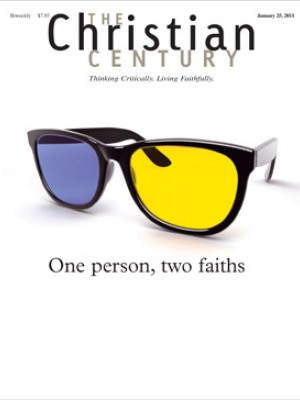Does atheist jeopardize church-state separation?
He is the most famous—and perhaps the loneliest—atheist in the
country. For 14 years, Michael Newdow, an emergency room doctor and an
attorney, has challenged what he sees as violations of the First
Amendment's prohibition against governmental endorsement and support of
organized religion—the so-called church-state separation clause.
Newdow
works alone from his Sacramento, California, home. His only tools are a
computer, a printer and a razor-sharp sense of injustice. He has sued
to have "In God We Trust" removed from U.S. currency, to bar prayer at
presidential inaugurations and most famously—or infamously—to strike the
phrase "under God" from the Pledge of Allegiance.
Read our latest issue or browse back issues.
To date, Newdow has never won a single case. Yet he remains undeterred.
He
has plans to ask the U.S. Supreme Court early this year to hear his "In
God We Trust" case, which he lost last March at the California-based
Ninth U.S. Circuit Court of Appeals. After that, he said, he may revive
his pledge case, this time on behalf of other families who feel harmed
by the pledge's religious reference.
"I don't think there is any question that I am right," said Newdow, 57, who was raised in a nominally Jewish home but told the Brown Alumni Magazine
that he was "born" as an atheist. "I am going to keep fighting,
hopefully winning, and getting the government to do what it is supposed
to do, which is [provide] equal protection for all religious views."
Constitutional
scholars and religious liberty activists agree with Newdow that the
First Amendment protects against a government establishment of
religion. But many disagree with his choice of battles.
The
greatest fear, even among those who share Newdow's views, is that if he
were to win, Congress could pass a constitutional amendment that changes
the First Amendment's Establishment Clause and possibly erode the
separation of church and state.
"There is a deep concern on the
separationist side that some of their major fights could be weakened if
they spend their resources and squander public opinion on fights they
are not going to win anyway," said Charles Haynes, director of the
Religious Freedom Education Project at the Newseum in Washington. "They
have to pick their battles and use their resources strategically. I
think that is why he is not getting full-throated support."
The
president of American Atheists, David Silverman, said, "Newdow is a
good man with good ideas and too little patience." American Atheists was
founded by the late Madalyn Murray O'Hair, who successfully sued to ban
teacher-led prayer in public schools in 1963.
"When his suits
fail, they can make matters worse by setting a precedent that can be
used against us in other lawsuits," said Silverman.
Newdow fights
his uphill battles alone from his kitchen table, where he does most of
his work. He says he has never received financial assistance from
church-state separationist groups and has paid for his filing and
printing costs with private donations.
Newdow's court battles
recently shifted into a bid to challenge family statutes he considers
unfair. The father of a 16-year-old daughter, he does not have equal
custody with the girl's mother, to whom he was never married.
Newdow
graduated from the University of Michigan's law school in 1988 but
returned to his career as an emergency room doctor. In 2002, he sued his
daughter's California school district for leading students in the
Pledge of Allegiance, which since 1954 has included the phrase "under
God."
No one in the legal community gave Newdow much attention
until he won on appeal in the Ninth Circuit. A number of organizations
filed amicus briefs in support of his case, including the Freedom From
Religion Foundation, Americans United for the Separation of Church and
State and American Atheists.
Newdow, who had never argued a case
before, represented himself before the U.S. Supreme Court in 2004 and by
all accounts held his own. The court rejected his claim, however, after
justices decided that as a noncustodial parent, he lacked standing to
bring the case on his daughter's behalf.
So far, he has lost all
of his cases on either their merits or because of a lack of legal
standing. But the losses may only be a part of Newdow's legacy.
"Win
or lose, without these fights there is no public awareness of the
plight of nonbelievers," said Dan Barker, copresident of the Freedom
From Religion Foundation. "If you are right about this—and he is—it's
worth it to fight because even when you lose, someone is educated. Mike
is putting us on the map."
Haynes of the Freedom Forum agreed. "I
think he has put a face on the contemporary reality that many Americans
do not have a religious affiliation," Haynes said. "For any cause to
advance and for any voice to be heard, someone needs to be the face of
that movement and give voice to those concerns. In that sense, Michael
Newdow has been very successful."
For his part, Newdow seems
unfazed by his legacy or his popularity. He says he remains focused on
his fight, which he says actually has little to do with religion. "I've
said it is not a case of people who believe in God versus people who
don't believe in God," he said. "It is about people who believe the
government should treat us all equally and those who want their view
favored above others. You can't do that. That is what our Constitution
says." —RNS






